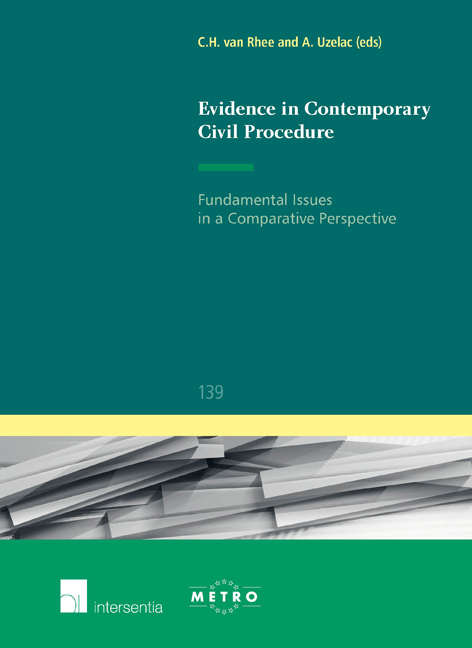Book contents
- Frontmatter
- Contents
- List of Authors
- Acknowledgements
- INTRODUCTION
- FUNDAMENTAL AND OTHER PRINCIPLES OF EVIDENCE IN CIVIL LITIGATION
- TYPES OF EVIDENCE IN CIVIL LITIGATION
- EVIDENCE IN ARBITRATION AND NATIONAL CIVIL LITIGATION
- EVIDENCE: LEARNING FROM ARBITRATION
- EVIDENCE IN CIVIL PROCEDURE IN THE NETHERLANDS: TRADITION AND MODERNITY
- TAKING OF EVIDENCE IN CROATIAN APPELLATE COURTS: WHY NO FACT-FINDING AT SECOND INSTANCE?
- EVOLUTION OF THE POWERS OF THE JUDGE AND THE POWERS OF THE PARTIES REGARDING THE TAKING OF EVIDENCE IN SOUTH AFRICA
- REGISTRAR
- EVIDENCE IN CROSS BORDER CIVIL LITIGATION
- IUS COMMUNE EUROPAEUM
TAKING OF EVIDENCE IN CROATIAN APPELLATE COURTS: WHY NO FACT-FINDING AT SECOND INSTANCE?
from EVIDENCE IN ARBITRATION AND NATIONAL CIVIL LITIGATION
Published online by Cambridge University Press: 15 December 2017
- Frontmatter
- Contents
- List of Authors
- Acknowledgements
- INTRODUCTION
- FUNDAMENTAL AND OTHER PRINCIPLES OF EVIDENCE IN CIVIL LITIGATION
- TYPES OF EVIDENCE IN CIVIL LITIGATION
- EVIDENCE IN ARBITRATION AND NATIONAL CIVIL LITIGATION
- EVIDENCE: LEARNING FROM ARBITRATION
- EVIDENCE IN CIVIL PROCEDURE IN THE NETHERLANDS: TRADITION AND MODERNITY
- TAKING OF EVIDENCE IN CROATIAN APPELLATE COURTS: WHY NO FACT-FINDING AT SECOND INSTANCE?
- EVOLUTION OF THE POWERS OF THE JUDGE AND THE POWERS OF THE PARTIES REGARDING THE TAKING OF EVIDENCE IN SOUTH AFRICA
- REGISTRAR
- EVIDENCE IN CROSS BORDER CIVIL LITIGATION
- IUS COMMUNE EUROPAEUM
Summary
Introduction
The regular form of appeal proceedings in countries of the European continental legal tradition involves review of facts and law. The appellate court re-examines the evidence and legal arguments advanced at first instance with a view to correct errors in adjudication and procedure. In some European legal systems, parties may introduce facts and evidence which were not addressed in the original judgment, and the appellate court may examine them at a new hearing. Often, however, litigation on appeal does not involve an actual second de novo hearing in which all evidence is introduced anew. The review may be limited to the examination of the first instance files. Based on the review of documents and protocols of the first instance court, the appellate court may (or may not) make its own independent findings of fact.
In a number of countries of the European continental legal tradition it is quite common and normal to hold oral hearings before appellate courts with the purpose of establishing facts and reviewing the findings of the first instance court. This contribution will, however, present as a contrast one example where this regularly does not happen: in post-Yugoslav countries. As a particular example of this procedural style, we will use the law and practice in the Republic of Croatia.
Oral Hearings in Croatian Appellate Courts: From a TheoreticalOption to a Legal Impossibility (and Back)
The story about the introduction and abolition of oral hearings in the Croatian appellate courts is one of trial and error. Initially, until the 2003 Amendments to the Civil Procedure Act, the option of holding oral hearings for the purpose of reexamination of evidence in the appellate courts existed, but it was dependant on the discretionary decision of the appellate courts. The courts almost never made use of this option, so the 2003 Amendments abolished this option entirely. However, the 2008 CPA Amendments reintroduced the facultative possibility of holding oral hearings before the appellate court. The option of appellate evidentiary hearings was strengthened further in the latest 2013 CPA Amendments. Namely, following several decisions of the European Court of Human Rights that declared the practice of successive remittals to be one of the systemic problems of Croatian civil procedure, the CPA amendments over the last five years progressively introduced a prohibition of multiple remittals of first instance judgments.
- Type
- Chapter
- Information
- Evidence in Contemporary Civil ProcedureFundamental Issues in a Comparative Perspective, pp. 291 - 310Publisher: IntersentiaPrint publication year: 2015



